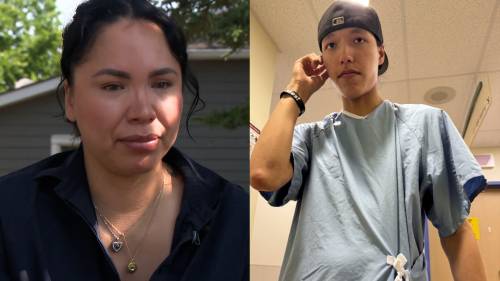As I walk through the quiet hallways of Alberta Children’s Hospital, the familiar weight of a difficult story settles in. This isn’t my first time covering healthcare challenges facing Indigenous families, but 14-year-old Jayda Bigplume’s situation strikes a particularly troubling chord.
The Calgary teenager’s health has deteriorated significantly while her family navigates a frustrating maze of bureaucracy, waiting for funding through Jordan’s Principle – a program specifically designed to ensure First Nations children receive the healthcare they need without delays caused by jurisdictional disputes.
“We’ve been waiting since November,” explains Jayda’s mother, Vanessa Bigplume, her voice steady despite obvious exhaustion. “Every day that passes is another day my daughter suffers unnecessarily.”
Jayda’s condition includes severe neurological symptoms requiring specialized care. Her family has been caught in what many Indigenous advocates describe as a systemic problem plaguing the healthcare funding process.
This situation painfully illustrates the ongoing challenges Indigenous families face accessing timely healthcare in our city. According to data from Indigenous Services Canada, approximately 25% of Jordan’s Principle applications experience processing delays exceeding standard timelines, with some families waiting months for decisions.
“The system essentially forces families to become full-time advocates while simultaneously caring for critically ill children,” notes Dr. Alika Lafontaine, president of the Canadian Medical Association and the first Indigenous physician to hold the position. “The bureaucratic requirements create barriers that wouldn’t exist for non-Indigenous patients.”
Jordan’s Principle was established following the case of Jordan River Anderson, a First Nations child who died in hospital while the federal and provincial governments disputed who should pay for his home care. The principle states that the government of first contact should pay for services and seek reimbursement later rather than delaying care.
Yet despite this clear mandate, families like the Bigplumes continue facing extensive waits.
“I’ve been covering Calgary’s healthcare system for nearly fifteen years, and these jurisdictional gaps remain frustratingly persistent,” shares Dr. Gabrielle Lindstrom, Indigenous health researcher at Mount Royal University. “The promise of Jordan’s Principle remains unfulfilled when families still wait months for essential care funding.”
Walking through the Foothills Industrial area last week, I passed the offices where many of these funding decisions happen. The contrast between the urgency of Jayda’s needs and the seemingly glacial pace of administrative processes couldn’t be more stark.
The Bigplume family has now turned to community fundraising while continuing to navigate the application process. Local Indigenous support networks have rallied around them, but their experience highlights a troubling pattern in our healthcare system.
“We shouldn’t need to beg for help,” says Vanessa. “This principle exists precisely to prevent children from suffering while governments figure out paperwork.”
According to the First Nations Health Consortium, which helps families navigate Jordan’s Principle in Alberta, application volumes increased 30% last year while staffing resources remained largely unchanged. This growing gap has contributed to lengthening wait times for many Calgary families.
What makes Jayda’s situation particularly concerning is how her health has visibly declined during the waiting period. Treatments that might have prevented deterioration remain inaccessible without funding approval.
“The irony is painful,” notes Elder Roy Bear Chief, who advocates for Indigenous families navigating health systems. “A program created specifically to eliminate delays is itself plagued by delays.”
Indigenous Services Canada spokesperson Marie-Claude Lacasse responded to inquiries about Jayda’s case by stating the department cannot comment on specific applications but acknowledged that “processing times vary based on complexity” and that they “remain committed to timely responses.”
For families like the Bigplumes, such statements offer little comfort as they watch their child’s condition worsen.
This issue extends beyond individual cases, reflecting broader challenges in how healthcare systems interact with Indigenous communities in Calgary and throughout Alberta. The Truth and Reconciliation Commission specifically addressed these systemic inequities in its Calls to Action, yet progress remains inconsistent.
As I leave the hospital after speaking with the family, the afternoon sun casts long shadows across the parking lot. Similar shadows seem to fall across our healthcare system – areas where promises of equity and timeliness haven’t yet reached.
For Jayda and countless other Indigenous children in our city, these bureaucratic shadows have real consequences. Their stories remind us that behind every funding delay is a child whose health hangs in the balance – waiting for systems to work as intended.
The question for Calgary now isn’t whether we can do better, but why we haven’t already.







